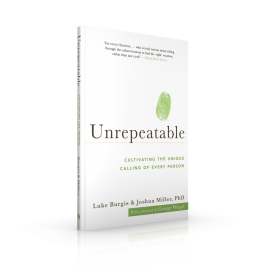By Luke Burgis and Joshua Miller
Luke Burgis is Entrepreneur-in-Residence at the Ciocca Center for Principled Entrepreneurship at The Catholic University of America. Joshua Miller, PhD, is the co-founder of Inscape. He also helped build The Center for Leadership at Franciscan University of Steubenville where he currently serves as personal vocation mentor and mentor trainer for faculty and staff. Together, they wrote Unrepeatable: Cultivating the Unique Calling of Every Person.

When God created man in His own image, He gave him a vocation in the same breath: “Be fruitful and multiply, and fill the earth and subdue it; and have dominion over the fish of the sea and over the birds of the sky and over every living thing that moves upon the earth” (Gen 1:28).
Have you ever heard someone say that their calling in life is to be fertile and multiply, to fill the earth and subdue it, and to rule over the fish of the sea and the birds of the sky? Probably not.
But this doesn’t mean that the primordial vocation in Genesis is not part of every vocation. Rather, it points to two important realities: First, that God revealed the full meaning of vocation gradually, in history; and second, that every person is called to such a radically unique, personal vocation that every other calling—marriage, family, priesthood, work, multiplying and subduing the earth—does not compete with it, but subsists in it.
The word “subsists” means that all of the ways that God calls a person—to a state of life, to a particular kind of work, to holiness—find their meaning in the one personal vocation received by God in the act of creation. There are not multiple vocations any more than there are multiple bodies of Christ. There is one person, called to a unity of life and love.
People use the word “vocation” in many different ways, though, to refer to different aspects of calling. “Personal vocation” is the spirit that animates all of them—the way they are lived out. Personal vocation does not sit beside them: it comes before, after, above, and below them.
It’s helpful to understand all of the ways that people use the word “vocation.” Here are the most common ways that the word is used:
Vocation as Being. Pope John Paul II said, “Every life is a vocation.” All of created reality has an eternal vocation—even the sun and stars—because God’s redemption extends to all matter. Nothing is created without a purpose. From the first moment of its existence, each thing has an “end” to which it is called. Abortion is always the loss of a vocation: a unique, unrepeatable life, destined to manifest the glory of God in a singular way. That life is destroyed in the womb by an adult who can’t see a person, let alone a vocation. Nothing is called into existence without a vocation.
Vocation as Self-Actualization. In the secular world, the concept of self-actualization, or achieving one’s full potential, is often couched in vocational terms. It’s part of the American psyche, from the U.S. Army’s slogan, “Be All You Can Be,” to the ideal of the “self-made man,” epitomized at one time by John D. Rockefeller. There is truth in self-actualization to the extent that, in our creative freedom, we have the power to shape our lives within certain bounds. But this individualistic idea of fulfillment lacks all sense of communion, of love, and of the supernatural end to which we’re called.
Vocation as the Universal Call to Holiness. All of the baptized are called to be saints. In every state of life, God calls people to live the heroism of ordinary life, investing all of their actions with love. This makes them extraordinary. In 1930, Pope Pius XI wrote:
For all men of every condition, in whatever honorable walk of life they may be, can and ought to imitate that most perfect example of holiness placed before man by God, namely Christ Our Lord, and by God’s grace to arrive at the summit of perfection, as is proved by the example set us of many saints.
Vocation as State in Life. This is the most common usage of the word “vocation” among Catholics. It refers to four traditional states in life: marriage, priesthood, religious life, or single life. No doubt these basic commitments in life orient and put boundaries around one’s actions in the world (in the best possible way)—they are the way of love that a person walks. A married man can look at his wife’s face and think, “She is my pathway to heaven.” A priest could think the same when he picks up his breviary, celebrates the Mass, or listens to the penitent sitting in front of him in the confessional. But “state in life” does not constitute the totality of a vocation. It is simply the “state” in which one is called to live and love.
Vocation as Work or Task. Many people feel called to dedicate themselves to a specific job, task, or ministry. This can certainly be part of God’s call. It’s dangerous to associate vocation only with doing, though.
In the early twentieth century, the sociologist Max Weber popularized the idea that the Protestant work ethic was the virtuous driver of capitalism. Karl Barth, the great reformed theologian, pushed back strongly against this notion, warning that the identification of “vocation” with “profession” could easily lead to secularization. He was right. Work becomes a pathway to holiness only when it maintains its “vertical horizon,” contributing not only to the improvement of the material world but also to the sanctification of the world.
These senses of vocation have jockeyed for position over the years. In Sacred Scripture, it would seem that only a select few people were called by God to some specific task: the prophets, the judges, Moses, and a few other “chosen ones.” What about everyone else? Here we need to make a critical distinction between an objective call from the Creator and the subjective awareness of that call. All have been called to a personal vocation in the very act of creation, but not all are fully conscious of what it is. And that’s okay. Because even when we don’t know how to speak the word at the center of our soul, the Holy Spirit does. “[T]he Spirit helps us in our weakness; for we do not know how to pray as we ought, but the Spirit himself intercedes with sighs too deep for words” (Rom 8:26), writes Paul.
You Might Also Like

Unrepeatable is about the urgent need for each of us to cultivate the vocations of others and the steps we should take to do it well. By smartly weaving evocative stories of those who have radically lived out their callings with practical tools for discernment and mentorship, Luke Burgis and Joshua Miller—who have a combined twenty-five years of experience helping people and organizations discover their purpose—turn staid perceptions of vocation on their head.

